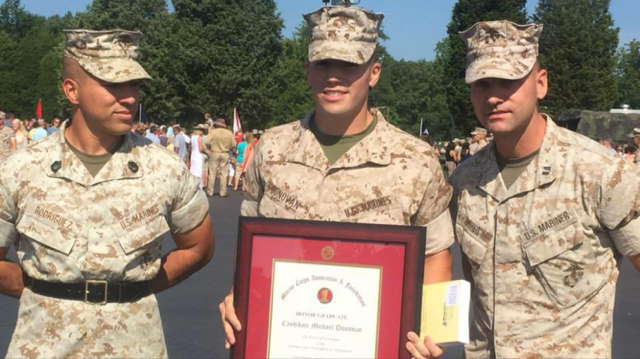Senior wins Marine Corps Commandant’s Trophy

Michael Donovan (center), an electrical engineering and mathematics major originally from Appleton, has been awarded the Marine Corps Commandant’s Trophy as the top candidate at the U.S. Marine Corps Officer Candidates School.
Members of the United States Marine Corps like to say that Marines run toward battle, not away from it. Michael Donovan wanted to know if he could lead his peers through those chaotic situations.
“It was a matter of pride, to see if I had what it took,” says Donovan, a senior at the University of Wisconsin–Madison.
So far, it seems as though he does.
Donovan, an electrical engineering and mathematics major originally from Appleton, Wisconsin, has been awarded the Marine Corps Commandant’s Trophy as the top candidate at the U.S. Marine Corps Officer Candidates School (OCS).
“There was no surprise when he came in first,” says Gunnery Sgt. Raymond Cano, Donovan’s sergeant instructor. “The whole staff knew that he was the best in the company.”
Col. Jason Morris, commanding officer of the 9th Marine District, will present the trophy to Donovan at halftime of the Badgers’ men’s basketball game vs. UW-Milwaukee on Wednesday, Dec. 9, at the Kohl Center in Madison. Chancellor Rebecca Blank will accept the trophy, recognizing the university’s contribution to Donovan’s success.
“There was no surprise when he came in first. The whole staff knew that he was the best in the company.”
Gunnery Sgt. Raymond Cano
As the top graduate of OCS, held in Quantico, Virginia, Donovan was evaluated on academic performance, physical fitness and leadership. Through two grueling six-week sessions (one in 2014 and one in 2015), he distinguished himself out of 234 initial candidates. The number dwindled to 190 as candidates succumbed to injury, dropped out or were asked to leave.
Despite a deliberately thorny evaluation period designed to break candidates down under pressure, Donovan never failed an event.
“Most individuals that go there want to pass everything, fly under the radar and go home a graduate,” says Capt. Chad Luebke, Donovan’s recruiter and mentor. “To receive this distinction, not only do you need to do well, you need to stick your neck out, even if it means risking failure in a high-profile situation.”
Growing up in a family with a rich military background, Donovan always wanted to serve. Choosing UW–Madison for its rigorous reputation in science and engineering, he initially joined the Army ROTC program, but switched tacks to enroll in the Marine Corps Platoon Leaders Course as a sophomore.
Approximately 40 percent of officers in the Marines are commissioned through the course, which focuses a candidate’s training on two summer sessions. Others, including ROTC members and older candidates, attend a single 10-week session.
The quick operating tempo at OCS leaves six hours at most for sleep — hours often used instead for study, or reduced to two hours at a time due to events. Sleep deprivation and a feeling of malnourishment (despite close monitoring of nutrition) contribute to fatigue; events occur in rapid succession to keep candidates ready for action.
“You’re in charge of America’s sons and daughters. They don’t want you to have any doubts about this; if you do, people are going to get hurt.”
Michael Donovan
“They’re testing you mentally and physically to see if you can handle it,” says Donovan. “You’re in charge of America’s sons and daughters. They don’t want you to have any doubts about this; if you do, people are going to get hurt.”
As Assistant Marine Officer Instructor for the Naval ROTC program at Marquette University, Cano knew Donovan by name before becoming his sergeant instructor. Cano typically looked to candidates like Donovan, with one session under their belts, to show newer students the ropes. As Donovan stepped up, he immediately emerged as a top candidate for the trophy.
“Leading his peers is not easy to do, and is one of the things that most people fail at OCS,” says Cano. “He led by example. He was the last one to eat, but if he told people to eat faster because we had to go somewhere, he was the first one done, even if he didn’t get to eat everything.”
“Your ego’s going to get bruised up a little bit. You need to accept criticism, adapt and overcome. That’s what Michael had going for him. In the end, it paid big dividends.”
Capt. Chad Luebke
Luebke points out the importance of confidential peer evaluations, balancing behind-the-scenes cooperation with what a candidate displays in front of staff.
“It’s a delicate balance,” says Luebke. “You’re all trying to lead each other, but probably 80 percent of the time you’ve got to be an outstanding follower. If you’re not a good teammate, that will shine through.”
Donovan considers UW–Madison crucial to developing that spirit.
“Being an engineer at a university like this provides you with a lot of problem solving you wouldn’t find at other places,” he says. “You’re always working on a project, late into the night. You develop a work ethic. Being part of group projects gave me opportunities to take the lead and delegate.”
After graduating in December 2016, Donovan will accept a commission as a second lieutenant. He will go through a year of training before stepping in front of his fellow Marines as a leader, serving at least a five-year commitment.
Luebke notes that Donovan’s story may intimidate people who think such an honor can only be won by someone who is perfect at all times. That’s not the case.
“Your ego’s going to get bruised up a little bit,” says Luebke. “You need to accept criticism, adapt and overcome. That’s what Michael had going for him. In the end, it paid big dividends.”




